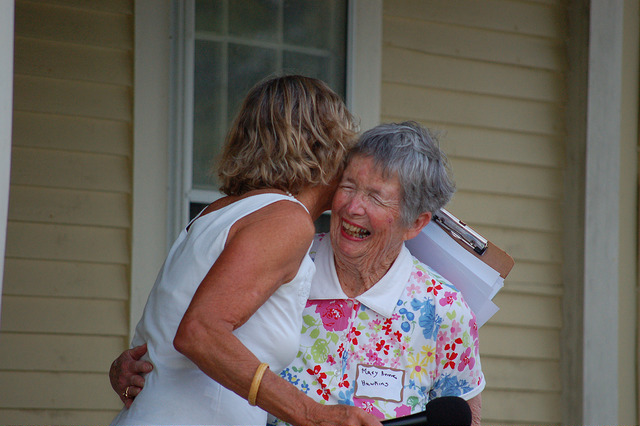The Wrack
The Wrack is the Wells Reserve blog, our collective logbook on the web.
The Wrack is the Wells Reserve blog, our collective logbook on the web.

The following was published in the Biddeford-Saco Journal Tribune Sunday edition, 7/3/2016, and Making It At Home's 7/6/2016 issue.
Every morning as I make my coffee, I watch the birds at the bird feeder outside my kitchen window. The other day I noticed, perched on the deck railing near the feeder, a brownish-greyish bird throwing a temper tantrum.
It would quiver and shake furiously until some of the brownish-whitish birds at the feeder would fly over to it and drop seeds into its waiting mouth. What a fascinating behavior, I said to myself, as my children at the table behind me clamored for breakfast.
[At this point, I readily admit that despite working at the Wells Reserve at Laudholm, a nationally-known center for science and nature, my bird identification skills are somewhere near the kindergarten level. In my yard, I frequently see Little Brown Birds and Bigger Red Birds, and sometimes even Zebra-Spotted Birds. Only with the help of the excellent Cornell Lab of Ornithology website, allaboutbirds.org, have I actually begun to learn the non-adjective names for some of the winged visitors to my little corner of South Portland. But you know, the dang things move so quickly, and really, who am I to say if one is brownish-white or whitish-brown? So the birds I reference in this column are most likely something completely different. You’re welcome.]
Back on my deck railing, the juvenile cowbird is still shaking, and the Some-Kind-of-Thrushes are still feeding it. Clearly, some adults of a different species are using precious time and energy to care for, and shut up, an annoying teenaged interloper.
I got such a kick out of watching such a philanthropic display. Later, after I learned more about the brown-headed cowbirds and their parasitic lifecycle, I felt less inspired, but at the time, the idea of volunteers in even the avian world struck me as delightful.
This week at the Wells Reserve, we’re bidding farewell to our longtime Volunteer Coordinator, Nancy Viehmann. Since 2000, Nancy has been a “fisher of men” (and women). She has built a community of more than 400 volunteers that helps the small staff manage this 2,200-acre coastal research center and historic site. This is special work, and I’m so glad we’ve found “another Nancy” to continue this essential activity of not only finding people to help us, but helping people find ways to help themselves.
Those who volunteer report greater life satisfaction, increased knowledge, lower rates of depression, better physical health and self-esteem, even longer lives. All that, and the Wells Reserve’s flower beds get planted, the beach and trails get monitored, the cars get parked, and our visitors get educated. Everyone wins.
As much I enjoy watching apoplectic cowbirds, I enjoy and value even more what I am privileged to see among our volunteers. I marvel at the hundreds of hours of labor freely given to mow lawns or repair old wooden windows most visitors will never notice. I cheer for 65th wedding anniversaries, I cross fingers for successful surgeries, I rejoice to watch multiple generations work and learn side by side.
The news seems filled with division and rage, violence and fear. Yet at any nonprofit in America, or church, or school, you can find volunteers every day sharing their time and talents to make their communities better for the future. This kind of service, of lifting up places and families and causes and needs, is so prevalent and yet so rarely reported on. It’s volunteers who keep America great, and we should all answer the calls to service our communities make.
I am proud to help run a place that has, since its very beginning, relied so heavily on volunteers. Without them, we would be nowhere and nothing. To me, our volunteers are a continual antidote to hatred and fear. And they’ve also taught this poor student what little he does know about birds.
Nik Charov is president of Laudholm Trust, the nonprofit partner of the Wells National Estuarine Research Reserve in Wells, Maine. His biweekly column, “Between Two Worlds,” ventures forth from the intersection of art and science, past and present, paid and unpaid. More at wellsreserve.org/twoworlds.